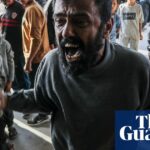The US secretary of state, Marco Rubio, will discuss the Gaza ceasefire with Israel’s prime minister in Jerusalem, launching a Middle East tour a day after the latest hostage-prisoner exchange.
On his first visit to the region as Washington’s top diplomat, Rubio is expected to push the US president Donald Trump’s widely condemned proposal to take control of the Gaza Strip and relocate its more than 2 million residents – which experts say would amount to ethnic cleansing.
The plan envisions redeveloping the coastal territory into the “Riviera of the Middle East” after it was devastated by more than 15 months of Israeli bombardments.
The Israeli prime minister, Benjamin Netanyahu, welcomed the idea during his recent White House visit, but foreign leaders have largely rejected it.
Rubio landed at Ben Gurion airport near Tel Aviv hours after Hamas freed three Israeli hostages in Gaza in exchange for 369 Palestinian prisoners – the sixth swap under the fragile ceasefire.
Negotiations on a second phase of the truce, aimed at securing a more lasting end to the war, are expected to begin next week in Doha.
Washington has said it is open to alternative proposals from Arab governments but insists that, for now, “the only plan is Trump’s”.
Rubio is also due to visit Saudi Arabia and the United Arab Emirates, with tough talks expected on Monday in Riyadh, a key player in Trump’s regional strategy.
“Israel will now have to decide what they will do,” Trump wrote on Truth Social. “The United States will back the decision they make!”
Israel has received a shipment of heavy MK-84 bombs from the United States, after Trump lifted a block imposed on the export of the munitions by the administration of his predecessor, Joe Biden, the defence ministry said on Sunday.
The MK-84 is an unguided 2,000 pound bomb, which can rip through thick concrete and metal, creating a wide blast radius.
The Biden administration declined to clear them for export to Israel out of concern about the impact on densely populated areas of the Gaza Strip.
Hamas and Israel are implementing the first, 42-day phase of the ceasefire that nearly collapsed last week after Hamas said it would pause releases over Israeli ceasefire violations. Israel has also accused Hamas of ceasefire violations.
Netanyahu credited “President Trump’s firm stance” with ensuring Saturday’s releases went ahead.
The freed hostages – the Israeli-American Sagui Dekel-Chen, the Israeli-Argentinian Iair Horn and the Israeli-Russian Sasha Troufanov – returned to emotional reunions with their families.
Israel freed 369 Palestinian prisoners, mostly Palestinians detained in Gaza during the war, but some were serving life sentences for attacks on Israelis.
Footage aired by Israeli media showed Palestinian prisoners in sweatshirts bearing a Star of David and the slogan: “We will not forget and we will not forgive”.
They tore them off upon reaching Gaza and burned them in a bonfire at the reception point in Khan Younis.
Ibrahim, 61, a freed prisoner who declined to give his full name, said he was shocked by Gaza’s devastation.
Arrested in northern Gaza’s Jabalia refugee camp, he said he still did not know why he had been jailed for nine months.
Since the truce began last month, 19 Israeli hostages have been released in exchange for more than 1,000 Palestinian prisoners.
Out of 251 people seized in Hamas’s 7 October 2023 attack on Israel that sparked the war, 70 remain in Gaza, including 35 the Israeli military says are dead.
The second phase of the ceasefire, still to be negotiated, is expected to include the release of the remaining hostages and discussions on ending the war.
Trump’s Gaza plan has heightened tensions.
The US president has warned of repercussions for neighbouring Egypt and Jordan unless they accept displaced Palestinians in Gaza.
Diplomats say Egypt is leading efforts to propose an alternative within weeks, focused on training a new security force and appointing local Palestinian leaders.
Rubio said he believed Arab states were “working in good faith” but insisted Hamas must have no future role.
Agence France-Presse and Reuters contributed to this report









